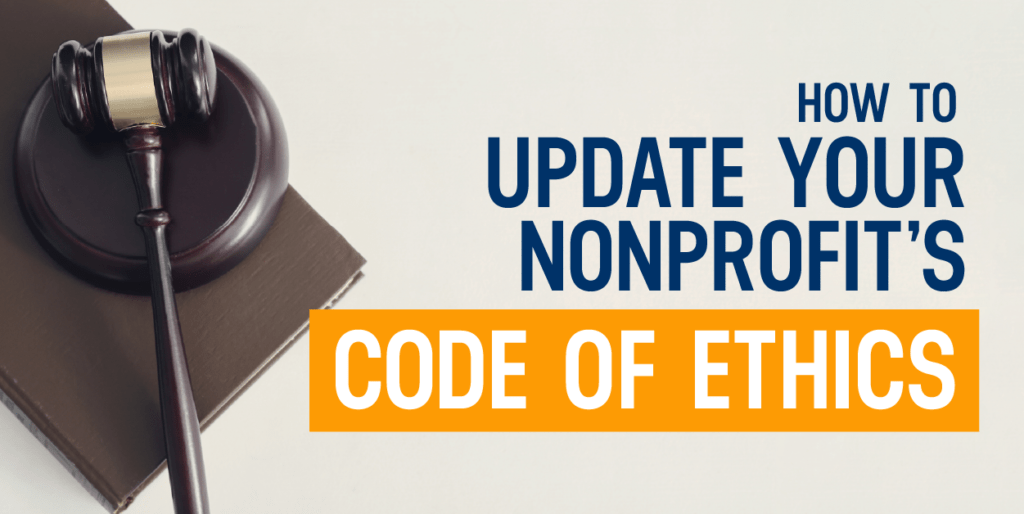
Is your current code of ethics still relevant? Your nonprofit’s code of ethics is a set of principles (e.g. values statement) that affects decision making. This is similar to, but different from, your code of conduct, which governs specific actions. Together, both codes play an important role in setting the ethical standards for your nonprofit organization.
To help your board members and staff conduct themselves honestly and with integrity, here are some factors you should consider when reviewing and updating your code of ethics.
Also read:
- Accommodating People With Disabilities At Meetings and Events
- Different is Stronger: Building Diverse Boards In Canada
- Building Sustainable Nonprofit Organizations with Marat Ressin
Why Does Your NPO Need To Review Its Code of Ethics?
With more nonprofit organizations getting online – social media, virtual meetings and websites – an association’s code of ethics needs to keep up with new ways of communicating with members and other stakeholders.
Tom Abbott, Managing Director of AMC NPO Solutions and a governance expert, said that by reviewing and updating your code of ethics, your nonprofit organization is demonstrating its commitment to practising ethical behavior.
“NPOs should review their codes of conduct, codes of ethics, and conflict of interest policies every one or two years, to earn and keep the public’s trust,” Abbott said.
Download your exclusive board performance self-evaluation form now.
Where Should You Start?
A code of ethics is a set of principles that affects decision making and describes the values of an organization. These principles could include statements based on the following values – and others not listed here:
- Accountability
- Diversity
- Fairness
- Honesty
- Innovation
- Learning
- Quality
- Self-Respect
- Teamwork
- Trustworthiness
Most nonprofit organizations put a lot of effort during strategic planning sessions, into defining and effectively communicating their values with their employees, members and other stakeholders.
We’re proud to share one of our client’s inspiring core values below:
North Okanagan Hospice Society
Respect: We respect the intrinsic worth of each individual.
Integrity: We act with intention in a fair, honest, and compassionate manner.
Inclusion: We are a community-based, community-driven organization striving to be accessible and inclusive.
Commitment: We work collaboratively and progressively in our pursuit of Quality End-of-Life Care.
Stewardship: We are accountable, to the communities we serve, for responsible management and wise and creative use of all available resources.
How To Set Ethical Standards
An important board responsibility is to set the ethical standards that are expected of those who will work at accomplishing the strategic goals of the organization.
“The board does this by developing and approving a Mission Statement, Vision Statement, Values Statement (Code of Ethics), a Director’s Code of Conduct, a CEO Code of Conduct, and a Conflict of Interest Policy,” Abbott said.
Also read: A Guide To Setting Ethical Standards For Your NPO
Create a Visual Flowchart
When faced with an ethical dilemma, it’s helpful to have a framework, flowchart or visual guide that illustrates an easy-to-follow process for ethical decision making. While a quick Google search for “ethical decision making model” will yield countless results, here are some essential ethical considerations:
- Who would be harmed?
- Are there transparency concerns?
- Is the action rational and explainable?
- Would there be the same concerns if I were the subject of the decision?
- Is the action consistent with the organization’s values and mission?
- Does our ethics officer or legal counsel agree with this decision?
Final Thoughts On Your NPOs Code of Ethics
“With appropriate versions of these personal performance policies, an NPO board of directors will have successfully articulated the ethical standards it expects from its directors, members and its CEO. The performance of these individuals can be monitored and compared to these standards,” Abbott said. As the proverb goes, an ounce of prevention is worth a pound of cure, so it’s important for nonprofit boards to have a strategy for dealing with ethical situations rather than being caught by surprise.
Need help increasing your nonprofit’s effectiveness?
An efficient board starts with the implementation of an effective governance model.
AMC’s governance training helps nonprofit boards navigate governance and management to stay focused on their organization’s mission and visions. It includes valuable tools and clear guidance to address many not-for-profit organizations’ governance challenges.
Join NPO Academy’s Online Board Governance Training and implement the Complementary Model of Board Governance to build an effective partnership between the volunteer board, CEO and staff.

